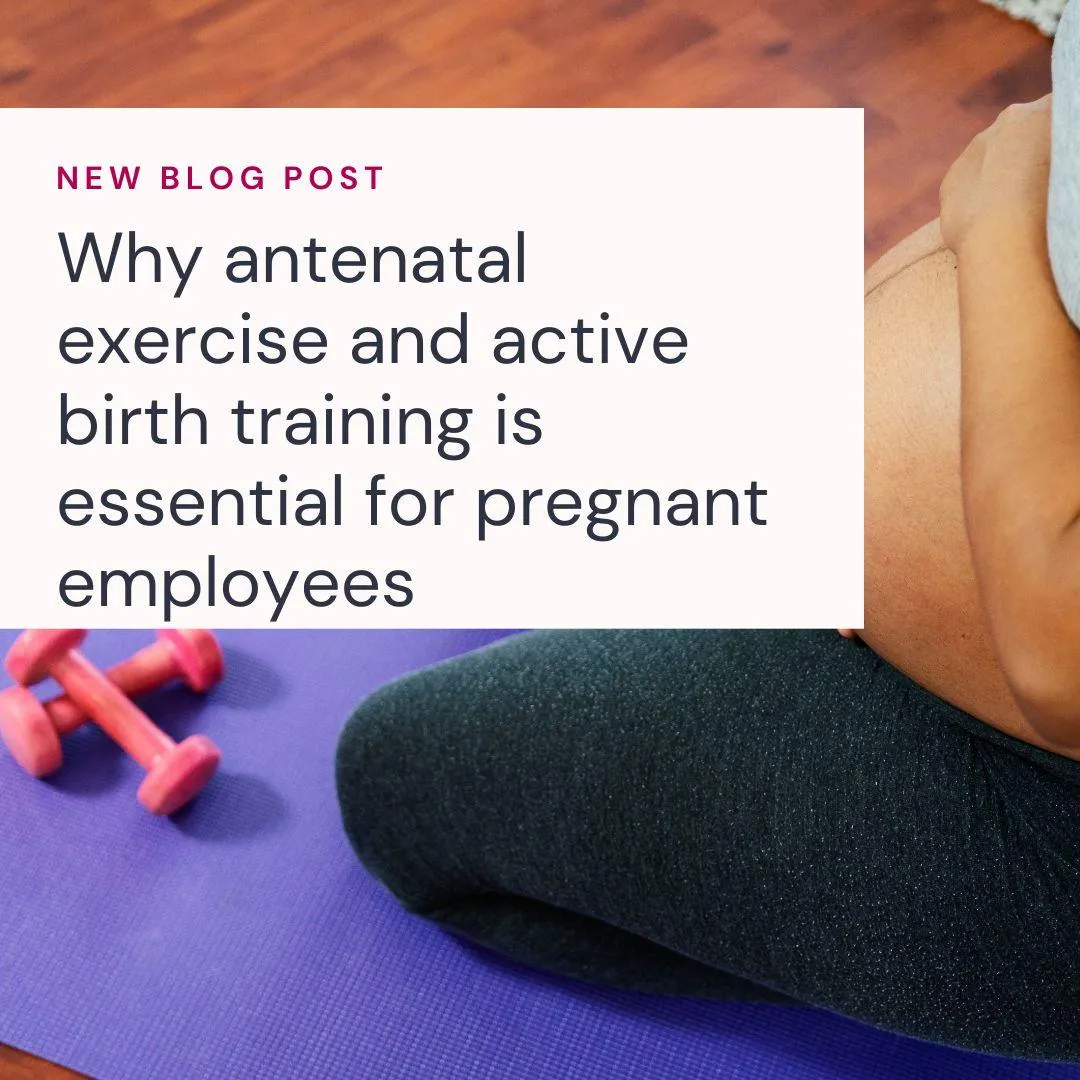The physical and mental health benefits of antenatal exercise as an employee benefit
Why antenatal exercise and active birth training is essential for pregnant employees

Investing in antenatal exercise and active birth education is not just a perk, it's an investment in a healthier, happier, and more productive workforce."
Jilly Clarke
Antenatal exercise is more than just staying fit during pregnancy – it provides vital support for both physical and mental health.
Studies show that exercise during pregnancy can reduce physical discomforts like back pain and joint issues, and improve sleep, conditions that affect many pregnant individuals and impact productivity. The Royal College of Obstetricians and Gynaecologists recommends that pregnant individuals do 150 minutes of exercise a week.
More research is being published all the time relating to the benefits of pre-natal exercise, a 2021 study found that antenatal exercise “can help preventing relevant pregnancy related disorders, such as gestational diabetes, excessive gestational weight gain, hypertensive disorders, urinary incontinence, fetal macrosomia, lumbopelvic pain, anxiety and prenatal depression. Exercise is not related with an increased risk of maternal or perinatal adverse outcomes.” Many of these conditions can lead to complications, additional monitoring and appointments, and give a higher chance of early births.
Mentally, exercise reduces stress and anxiety, releasing endorphins that improve mood. A 2024 study concluded that exercise commenced before 20 weeks of pregnancy, and continued can “significantly contribute to the improvement of antenatal depressive symptoms in pregnant women”
In the workplace, this contributes to sustained productivity and morale, showing how antenatal exercise programs can be a sound investment in employee well-being.
In the workplace, offering an antenatal exercise programme as part of a wider employee benefit package means healthier, more comfortable employees who are less likely to take sick leave due to pregnancy-related issues.
Additionally, exercise is known to boost mood by releasing endorphins, which helps manage stress and anxiety – key for maintaining productivity and morale during pregnancy.
How antenatal exercise reduces pregnancy-related absences and health risks
Antenatal exercise plays an important role in pregnancy and in reducing pregnancy-related employee absences, maintaining consistent attendance, and improving productivity.
By supporting physical activity in the workplace, employers can help employees manage symptoms and lowering chances of complications like preeclampsia; lowering health risks and minimizing the need for sick days. In turn, this creates a more reliable, healthy workforce and demonstrates the business case for offering antenatal support.
Research from The Journal of Perinatal Medicine found that pregnant people who engage in regular prenatal exercise experience fewer complications and hospital visits, as it strengthens muscles needed for labour, boosts stamina, improves confidence and self-efficacy levels, and helps control weight gain.

Preparing employees for labour with active birth training
Active birth training equips pregnant employees with knowledge and techniques to manage labour naturally and confidently, which benefits both the employee and the business.
This type of training emphasises movement, positioning, breathing, and relaxation strategies, which can reduce the need for medical interventions during birth.
According to The Cochrane Library, women who use active birth techniques report shorter labour times, lower rates of intervention, and more positive birth experiences. Pregnant individuals who participate in active birth classes experience shorter, less painful labour and report higher satisfaction with their birth experiences. A 2020 study found that combining active birth and hypnobirthing techniques “reduced pain, decreased anxiety levels, less use of analgesics, easier fetal head transmission and rotation, shorter duration than one stage of labor and increased maternal satisfaction and well-being.”
For businesses, this means employees are more likely to return from maternity leave feeling physically and mentally resilient, rather than traumatised by difficult births.
This support for healthier, more positive birth outcomes allows employees to return to work with greater resilience, both mentally and physically, and in a better frame of mind - benefits that extend to the workplace.

Improved postnatal recovery and return to work
Exercise and active birth training during pregnancy also speed up postnatal recovery. Though maternity leave in the UK allows for up to 12 months of leave, the quality of postnatal recovery during this time matters greatly for employees, and businesses.
Antenatal exercise supports faster, healthier recoveries by building physical resilience and lowering the chance of postnatal mood challenges, which affect 10-15% of new mothers (NHS).
This helps make the transition back to work smoother and ensures new parents can re-engage with their career goals confidently and healthily, strengthening both individual and company success.
Building a supportive, health-conscious workplace culture
As discussions around workplace well-being expand in the UK, companies that offer antenatal exercise and birth support programs set themselves apart as forward-thinking employers.
According to the Chartered Institute of Personnel and Development (CIPD), employees are increasingly attracted to workplaces that provide holistic health support, particularly during significant life events like pregnancy. According to CIPD, a workplace that prioritises health fosters stronger loyalty and engagement.
For companies, these benefits improve not only employee satisfaction but also retention and loyalty.
Providing antenatal support and exercise programs fosters a health-conscious, positive workplace culture, benefiting both the workforce and the business’s reputation as a supportive and employee-focused organisation.
Offering antenatal support reflects a company’s commitment to employees, contributing to a culture where people feel valued, safe, and empowered through major life changes. For both employee satisfaction and retention, these programs build a foundation of trust and support.
The long-term business benefits of antenatal exercise programs
While investing in antenatal exercise and active birth training might seem like an extra expense, the long-term gains far outweigh the costs. The business case is compelling, with long-term advantages for both employees and employers.
The International Journal of Workplace Health Management reports that companies with robust prenatal support see reductions in healthcare costs, lower absenteeism rates with less appointments and complications, and higher retention. The overall morale and loyalty of the
workforce increases when pregnant employees feel supported.
Supporting pregnant employees with targeted health programs can enhance their physical and mental well-being, improve their birth outcomes, and help them return to work stronger and more confident.
When employees experience better health and smoother transitions into parenthood, they return to work feeling supported, valued, and committed to their workplace.
For companies aiming to build a resilient, loyal workforce, investing in early parenthood support is a straightforward, impactful way to create positive, lasting change.
The Birth and Baby Company can help
Our on-demand antenatal courses, exercise videos and support programs provide expecting parents with the knowledge and confidence they need for a smooth pregnancy, birth, and transition to parenthood. Our range of packages can provide 1:1 support, regular Q&As. Crucially, all packages provide education on communication with healthcare professionals, understanding risks and options, knowledge on physically supporting themselves through pregnancy, birth and recovery, and advocating for their preferences.
Contact us today to learn how we can help your company support its most valuable asset – its people.
Home | About Us | Contact| Blog | Login | Corporate
© Copyright 2025 The Birth and Baby Company Ltd. All rights reserved. The Birth and Baby Company Limited is a limited company registered in England and Wales.
Company Registration Number: 15655287 | Our registered address is: 27 Wilshere Road, Welwyn, Hertfordshire, AL6 9PU
Privacy Policy | Terms & Conditions | Medical Disclaimer | Inclusivity & Accessibility
